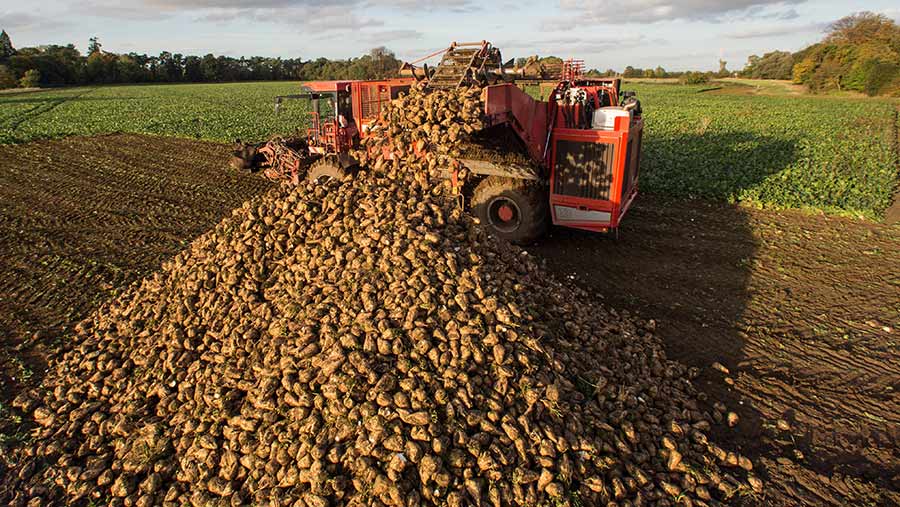Australia trade deal ‘risks UK sugar beet competitiveness’
 © Tim Scrivener
© Tim Scrivener An increase in sugar imports from Australia will make it “very difficult” for British sugar beet growers to remain competitive, the NFU has warned.
Cambridgeshire beet grower and NFU Sugar board chairman Michael Sly fired the warning after reports emerged that Boris Johnson’s government had agreed an immediate tariff-free quota for 80,000t of Australian sugar imports to the UK, rising by 20,000t each year.
Australia’s sugar cane growers welcomed the opportunity to grow sugar exports to the UK. Canegrowers – the Queensland Canegrowers Association – said it was a “significant boost” on the 9,925t to the whole European Union prior to Brexit.
See also: Tariff-free sugar imports ‘devastating’ for UK beet growers
“Importantly too, this agreement with the UK allows for the sugar trade to grow over time by 20,000t each year for the next eight years,” said Canegrowers’ chairman Paul Schembri.
“Australian sugar hasn’t had this kind of access since 1973, when the UK joined the then European Common Market.”
Sugar tariffs will be eliminated over eight years, according to the Australian trade minister Dan Tehan, after his government released details of the free-trade agreement (FTA) agreed “in principle” with the UK.
‘Substantial’ outcome
Canegrowers thanked Mr Tehan for his efforts in securing a “substantial and positive outcome for the [Australian] sugar industry.”
However, the details of the FTA were “concerning for British sugar beet growers”, said NFU Sugar board chairman Mr Sly.
“Giving away tariff-free access to a major exporter of sugar cane is worrying on its own, let alone alongside the existing quota that allows 260,000t of raw sugar to be imported tariff-free from anywhere in the world,” he added.
“It would appear that the government has not recognised the vast differences between British and Australian sugar production.
“British beet growers incur higher costs in producing to regulations not faced by Australian sugar cane growers, meaning we are not competing on a level playing field.”
Not a good day for British agriculture and the general public. If you don’t buy Silver Spoon @BritishSugar and buy cane sugar instead, you could be digesting the residues from 20+ plant protection products we are banned from using. That is one example.https://t.co/kdXX7Bp37e
— Andrew Ward ??? (@wheat_daddy) June 15, 2021
Sugar is Australia’s second-largest export crop, after wheat, with a total annual revenue of almost AU$2bn (£1.08bn).
About 95% of sugar produced in Australia is grown in Queensland, with the remainder in northern New South Wales.
The Conservative government will release the small print of the agreement in principle it has signed with Australia in the coming days.
In a statement, the party said: “British farmers will be protected by a cap on tariff-free imports for 15 years, using tariff rate quotas and other safeguards. We are also supporting agricultural producers to increase their exports overseas, including to new markets in the Indo-Pacific.”
Have your say
Australian sugar cane growers say they have hit the sweet spot with this trade deal. But for UK sugar beet growers what effect could this free-trade agreement, and others, have on your decision to continue growing the crop in the future? Contact Philip Case on 07522 946 089 or email philip.case@markallengroup.com
Farm leaders have accused the government of trying to sign a hasty deal with Australia without allowing proper scrutiny from the independent advisory body, the Trade and Agriculture Commission.
Three more ways the deal will benefit Aussie farmers
Beef Tariffs will be eliminated after 10 years. During the transition period, Australia will have immediate access to a duty-free quota of 35,000t, rising in equal instalments to 110,000t in year 10.
Sheep Sheepmeat tariffs will be eliminated after 10 years. During the transition period, Australia will have immediate access to a duty-free quota of 25,000t, rising in equal instalments to 75,000t in year 10.
Dairy Tariffs will be eliminated over five years. During the transition period, Australia will have immediate access to a duty-free quota for cheese of 24,000t, rising in equal instalments to 48,000t in year five.
Source: Australian Ministry for Trade, Tourism and Investment
